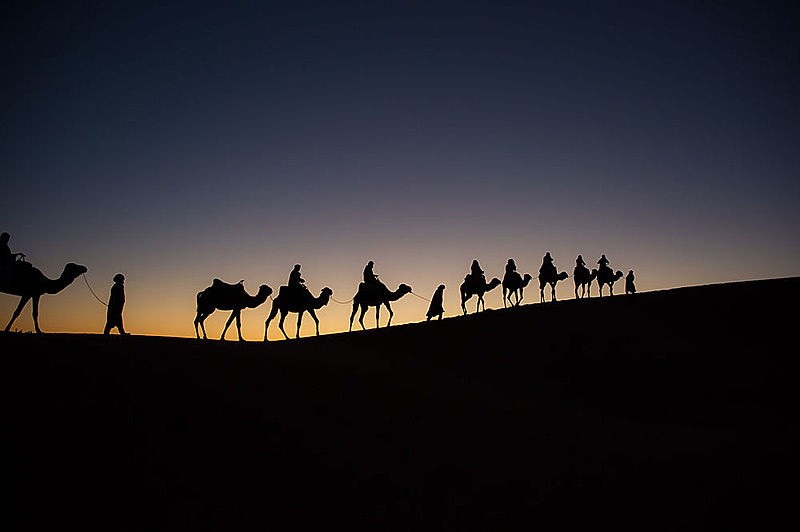The value of sacrifice in Islam
Meaning of sacrifice in the Quran

There is an Arabic saying which is regarding matters of seeking knowledge:
“If you do not give knowledge your all, do not expect to gain some of it”.
Upon hearing this advice being passed on from our teachers, one cannot help but wonder how much one has to offer or sacrifice in the journey to seek a valuable treasure. What qualifies as effort in this seemingly difficult exchange? How much time? How much money? How much self-preservation should be maintained in the name of sacrifice?
In addressing these dilemmas, Zulhijjah, the month of pilgrimage, is an opportune time for us to reflect on the value of sacrifice. This article intends to expound on the idea and meaning of sacrifice in Islam.
Read: Hajar and the significance of her sacrifice and perseverance
Inspiring examples of sacrifice during Prophet's s.a.w. time
During the time of the Prophet s.a.w, it could not be denied that Abu Bakar r.a. was his closest companion. It is important to point out that all of Prophet s.a.w’s companions would sacrifice what they could in the name of the Prophet and Islam. However, few could compare to the effort of Abu Bakar r.a. when he accompanied the Prophet s.a.w. during the emigration (Hijrah) to Madinah.
Abu Bakar r.a. risked his life for the Prophet s.a.w. countless times. He was there by the Prophet’s side throughout the journey, looking left, right, front and back, in case an arrow was to be shot from any direction or if an enemy were to ambush from an unknown location.
Upon reaching the cave of Thur to seek refuge, Abu Bakar r.a. went inside, braving the unknown, to ensure the safety of the Prophet s.a.w. He sacrificed his safety, comfort and well-being for the person he loved most and the cause that he so believed in.
 Jabal (Mountain) Thur houses a cave in which Prophet Muhammad s.a.w. and his companion, Abu Bakar r.a, sought refuge during their migration from Makkah to Madinah.
Jabal (Mountain) Thur houses a cave in which Prophet Muhammad s.a.w. and his companion, Abu Bakar r.a, sought refuge during their migration from Makkah to Madinah.
Prior to that moment, Ali r.a. also put his life on the line and acted as a decoy to draw away the attention of the people who intended to kill the Prophet. Even before the Prophet s.a.w. stepped out of Makkah, hundreds of believers planted firm resolve to proceed first with a decision that would change their lives too. This was a sacrifice in its own right.
Read: 5 key messages of the Hijrah
What is the value of sacrifice?

The story of Hijrah is one that we never get tired of, year in and year out. However, this world-changing event would not have happened if not for the commitment of many and the leadership of a great man - Prophet Muhammad s.a.w. He gave his all for those who lived in his era and those that came after him. The Prophet s.a.w. went through hardship and loss for something that was bigger than him and his people. Today, we wholeheartedly feel the enormity of the valuable outcome.
Read: The Prophet of mercy: Showing care and concern for others
 Aerial view of Masjidil Nabawi in Madinah.
Aerial view of Masjidil Nabawi in Madinah.
The meaning of the word ‘sacrifice’ is often associated with the loss of something valuable. However, the true value of sacrifice may not resonate as strongly for the one making the sacrifice until the fruits of their labour are seen or manifested.
Some examples of everyday sacrifices
Here are some examples of everyday sacrifices: a father or mother working tirelessly and refusing to rest just to ensure that the family is able to thrive, a single parent going through burnout and fatigue just to ensure the well-being of their child, a teacher spending time away from their own children in order to shape the development of other children, or an entrepreneur giving away profits to a local fundraiser so that the community is able to prosper.

Here, when the fruits of labour, or the sacrifice, are finally reaped, the value of what was contributed in terms of effort, time, and money will finally be brought to light. It is when the family is able to live well, the child is able to grow up successfully, the students become shining beacons of society, and the community progresses and develops beautifully that we recognise the priceless nature of sacrifice.
Read: Prophet Muhammad’s kindness and love for children
There may be times when we do not get to relish the results of our sacrifices. Although the reward or the goal might determine the value of sacrifice, we can also determine it by the sacrifice itself or the effort that it has cost us.
As German philosopher Friedrich Nietzsche once said: ‘The value of a thing sometimes lies not in what one attains with it, but in what one pays for it - what it costs us’.
Life is a matter of choices, they say, but some are compelled to perform duties that may take a toll on them because of love, responsibility or accountability, and this should also be valued.
Despite the nobility of sacrifice, it cannot be denied that this act can serve either good or ill. Sacrifice is typically linked to a strong purpose or a justifiable end, but human beings are not immune to the potential for selfishness and a distorted sense of justice. Therefore, it is always advisable that we firmly anchor the meaning of what we seek and every action we take to Al-Hakim, The Most Wise, and Al-Aziz, The Most Just.
Read: The power of intention in Islam: 3 things you need to know
The right sacrifice
Allah mentions in the Quran:
يَا أَيُّهَا الَّذِينَ آمَنُوا هَلْ أَدُلُّكُمْ عَلَىٰ تِجَارَةٍ تُنجِيكُم مِّنْ عَذَابٍ أَلِيمٍ
تُؤْمِنُونَ بِاللَّهِ وَرَسُولِهِ وَتُجَاهِدُونَ فِي سَبِيلِ اللَّهِ بِأَمْوَالِكُمْ وَأَنفُسِكُمْ ۚ ذَٰلِكُمْ خَيْرٌ لَّكُمْ إِن كُنتُمْ تَعْلَمُونَ
يَغْفِرْ لَكُمْ ذُنُوبَكُمْ وَيُدْخِلْكُمْ جَنَّاتٍ تَجْرِي مِن تَحْتِهَا الْأَنْهَارُ وَمَسَاكِنَ طَيِّبَةً فِي جَنَّاتِ عَدْنٍ ۚ ذَٰلِكَ الْفَوْزُ الْعَظِيمُ
“O you who have believed, shall I guide you to a transaction that will save you from a painful punishment? [It is that] you believe in Allah and His Messenger and strive in the cause of Allah with your wealth and your lives. That is best for you if you should know. He will forgive for you your sins and admit you to the gardens beneath which rivers flow and pleasant dwellings in gardens of perpetual residence. That is a great attainment.”
(Surah As-Saf,61:10–12)
One strives in Allah’s cause to attain paradise and mercy and avoid punishment. This is undoubtedly a high purpose a believer can seek. The means to sacrifice one’s wealth and life as per mentioned in the verse however are many. One might just possibly misinterpret verses from the Quran or hadith and end up sacrificing more than he/she ought to. It is even worse if the sacrifice that one makes does not fulfil the transaction that Allah has promised, making the sacrifice invalid.
The possibilities of invalid sacrifices can arise from:
1) Endangering the lives and well-being of others while performing what we assume is correct,
2) Performing deeds that outwardly are done for Allah, but the human heart thirsts for the praise of others, or
3) Performing with utmost sincerity but with little knowledge, resulting in incorrectly performed deeds.
Read: How to achieve sincerity in Islam
Hence, it is important to always seek knowledge from a teacher, such as ARS-certified teachers, and perhaps, have a trusted companion that can stay and guide you through thick and thin for the sake of Allah s.w.t.

The ability to perform sacrifices varies from person to person. Even the companion Umar r.a. could not compete with what Abu Bakar r.a. carried out. This happened where Umar r.a. donated half of his wealth only to find out that Abu Bakar r.a. had donated all of his wealth, as mentioned in a hadith narrated by Imam At-Tirmizi. Umar r.a. did not go to the extent of donating his remaining half of what he had because he knew the limits to what he was capable of.

However, Umar r.a. did what he could, to the utmost of his ability, which others might not be able to compete with. This shows us how vital it is to always reflect on the deeds that we offer and the sacrifices we are accountable for while ensuring we always do our best with what we have.
Conclusion - Quality of sacrifice
There is no replay button in life. You could view life as one big adventure with different journeys taking place at several points in time. For example, the journey for knowledge is one that stretches throughout life while moving in parallel with other journeys (of adulthood, career, the upbringing of family, etc.).
Read: Nurturing faith and Islamic knowledge starts from young

There is a reward for each journey we go through, even if it is filled with the mundane or the stresses of our daily lives. The Prophet s.a.w. promised this in the hadith of Hijrah:
“Those whose journey is to Allah and His Prophet, his journey will be for Allah and His Prophet. And those whose journey is for this world and its content or a woman he wishes to marry, then his journey will be for what he embarked on.”
(Sahih Al-Bukhari)
The daily routine we go through as believers and the sacrifices we make does not necessarily beget the results we want. With the right intentions, the comforts of paradise will be waiting at the end of our seemingly long, arduous journey.
And Allah knows best.


